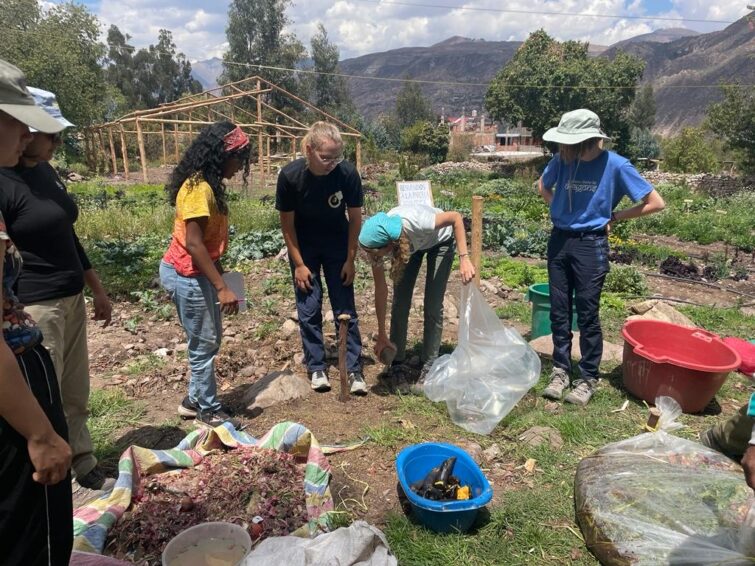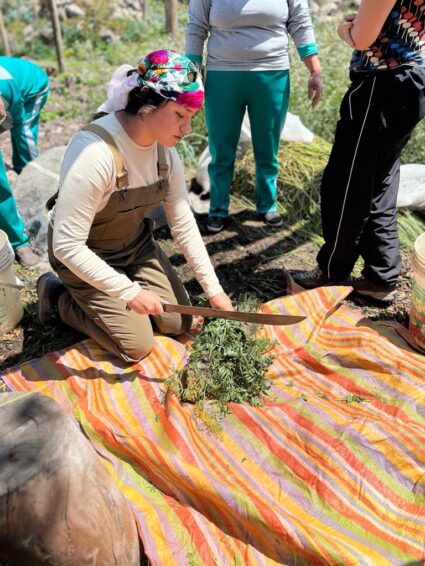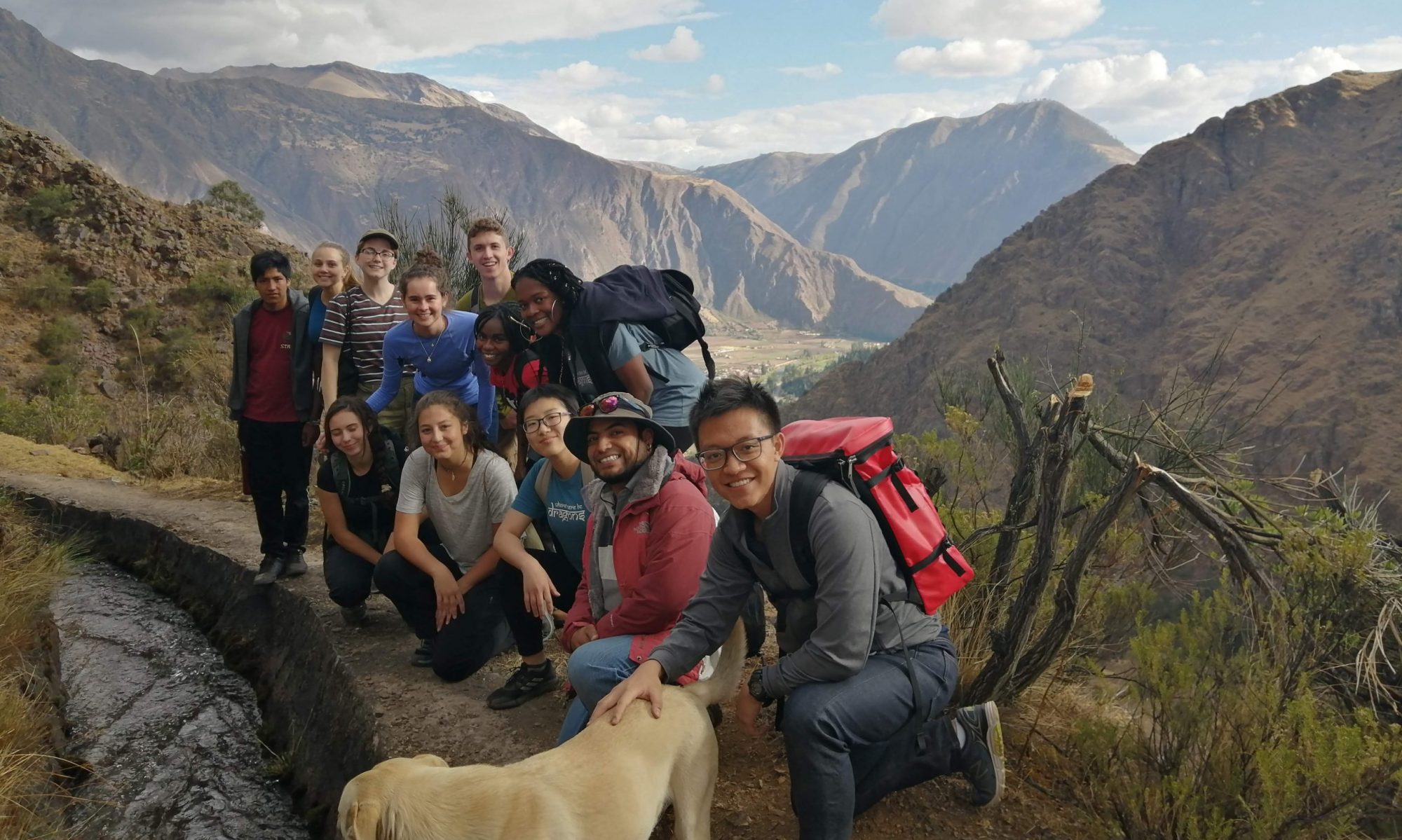by Teagan, Civic Semester Participant







What is sustainable farming? What does permaculture mean? Why is biodiversity important? And how do you achieve food sovereignty?
Last week, our cohort visited two local organizations dedicated to organic and sustainable farming in the Andes. One Monday, after a 45-minute walk uphill through unfamiliar streets, we were greeted by Liz, Magda, and Lucía from Canastas Verdes. Canastas Verdes is a small, women-led farming co-op in Urubamba that grows organic vegetables on their own land. Each woman wore a turquoise and gray sweat suit, a matching bucket hat, and a huge smile across their face. The women spoke Quechua to each other and Spanish to us, so Elaine, a student in our cohort, translated throughout the day. At Canastas Verdes, four to eight women work on any given day but there are only three main members who grow crops on the land adjacent to their homes. Liz took us on a tour of her parcel, the first and largest of the three that we would visit. She grew varieties of lettuce, kale, cauliflower, carrots, and other vegetables all within close proximity. Shade was provided by a dozen fruit trees surrounding the perimeter, and Liz gave us a few lemons and lúcumas (a native Peruvian fruit) to try. We passed around the lemon, taking turns biting into the peel and flesh. It was sour and delicious. The lúcuma was in lesser demand, as it had a dry texture like a sweet potato and a very subdued flavor.
Our first activity at Canastas Verdes was learning how to make organic fertilizer. We took turns chopping alfalfa and barley with a machete, mixing the yeast, water, and sugar in a 5-gallon bucket, and cementing our creation together like a cake. The layers alternated between the grassy mixture, dry leaves, cuy (guinea pig) manure, the water-yeast mixture, and a crushed concoction of eggshells, ash, and dried bird poop. When our stack was up to our knees, we flipped the “cake” over with a pitchfork in order for the ingredients to properly mix. Magda told us that the fertilizer would need to ferment for about three months before it could be used on the farm.
The rest of the day was filled with trying new foods and learning about traditional farming techniques. We made biocide from food scraps in a large plastic bag and planted a small lechuga (lettuce) patch on Lucía’s land. For lunch, we gathered outside of Lucía’s house under shade and snacked on fresh salad and corn kernels. She welcomed us into her home with open arms and encouraged us to try some traditional Peruvian snacks. Over food, we asked the women questions about their work, and for each question, they had a positive answer. The women said they did not face pushback from the community or the machismo culture. They were as capable as any other farming co-op although they did admit occasionally needing their husbands or sons for some of the most physically demanding tasks. The food grown at Canastas Verdes primarily goes to feeding their own families. Magda was proud to share that she had seen improvements in her own health and the health of her family since starting Canastas Verdes. They have had fewer doctor appointments, fewer illnesses, and higher immune systems. During the COVID-19 pandemic, none of the families tested positive even without the vaccine. The women at Canastas Verdes are very content with their current operations and have no plans to expand. The produce that they do not eat is sold at the local market or through a basket subscription program for the community. When they have too much, they give it away to their neighbors.
During our organization debrief a few nights later, we all shared what stood out to us from our visit. Some of the words that were thrown around were perseverance, resilience, and asset-based approach. We all agreed that government assistance is not as accessible for small organizations as it should be. Pablo, our instructor, explained that government assistance in Peru is nearly non-existent. We also shared that we were surprised about the process of getting organic certification. The process is long and costly, and because traces of pesticides can be found even after 10 years after switching to organic farming, Canastas Verdes was unable to get this important certification. At small-scale organizations, steps like this often hinder the ability to grow crucial partnerships with businesses and establish themselves as a more prominent producer in the community. In addition, we reflected on the effects of climate change on small farms like Canastas Verdes. In the Sacred Valley, almost all water flows through a series of streams originating in the glaciers high in the Andes, but the Sacred Valley has experienced drought for the past few years. The rainy season is months shorter than it once was, and the glacial streams are not as strong.
The questions that we entered Canastas Verdes with were now answered, but new questions arose. Canastas Verdes is dedicated to permaculture and food sovereignty which means they are a self-sufficient and self-reliant farm able to stand alone in the community. They use cuy manure in the fertilizer and feed the cuy with scraps from the produce. Everything at Canastas Verdes goes to use in a circular fashion, and with the help of biodiversity, the crops thrive from shared nutrients. Even without plans to expand, the mission of Canastas Verdes is inspirational, and their knowledge should be shared throughout the world.
